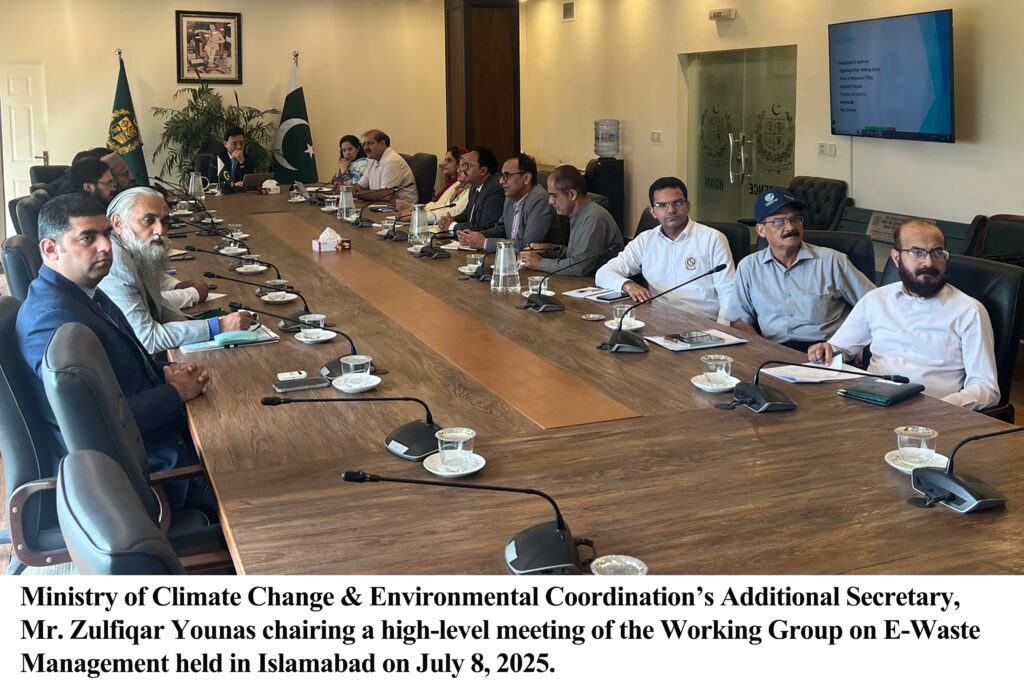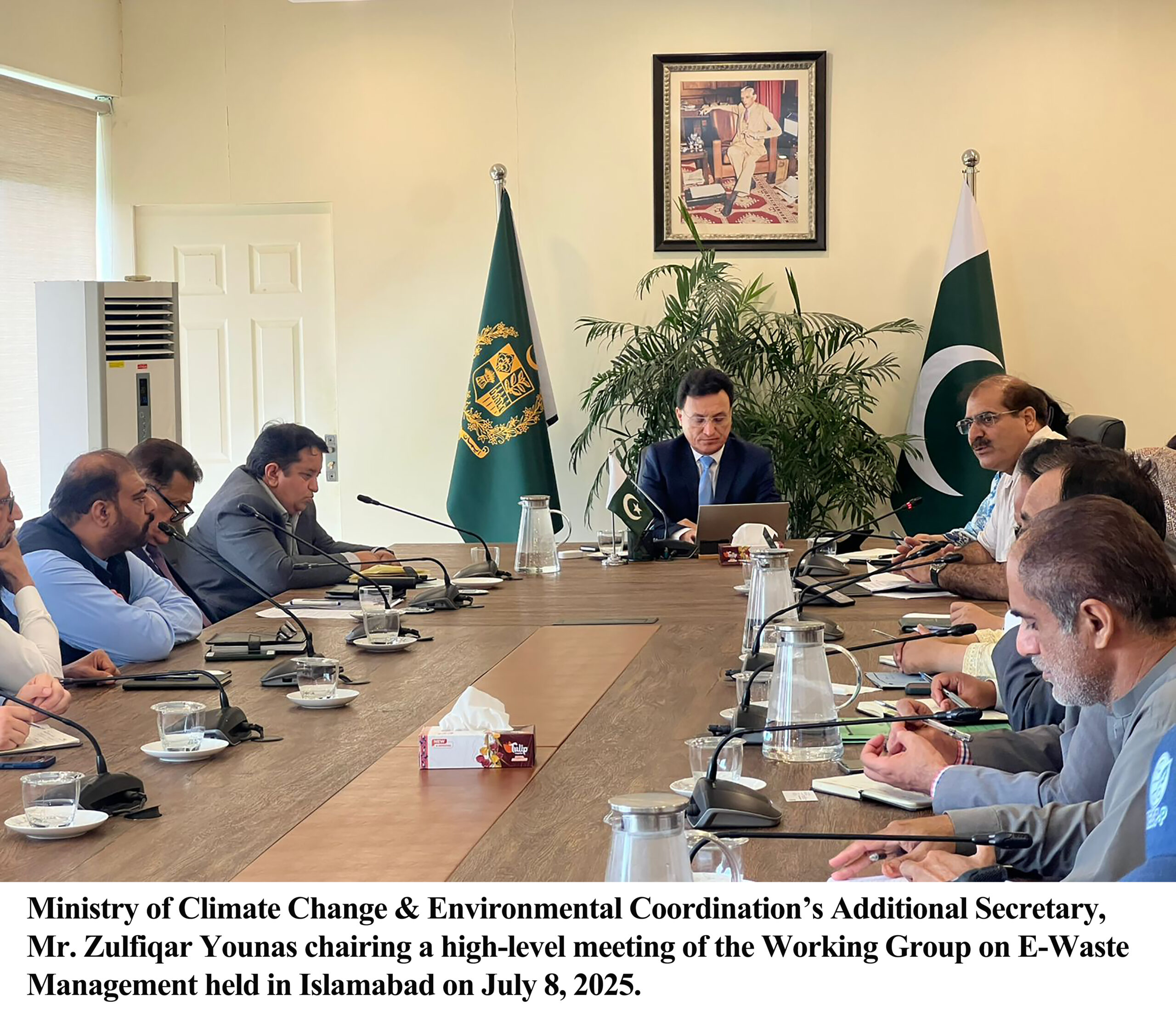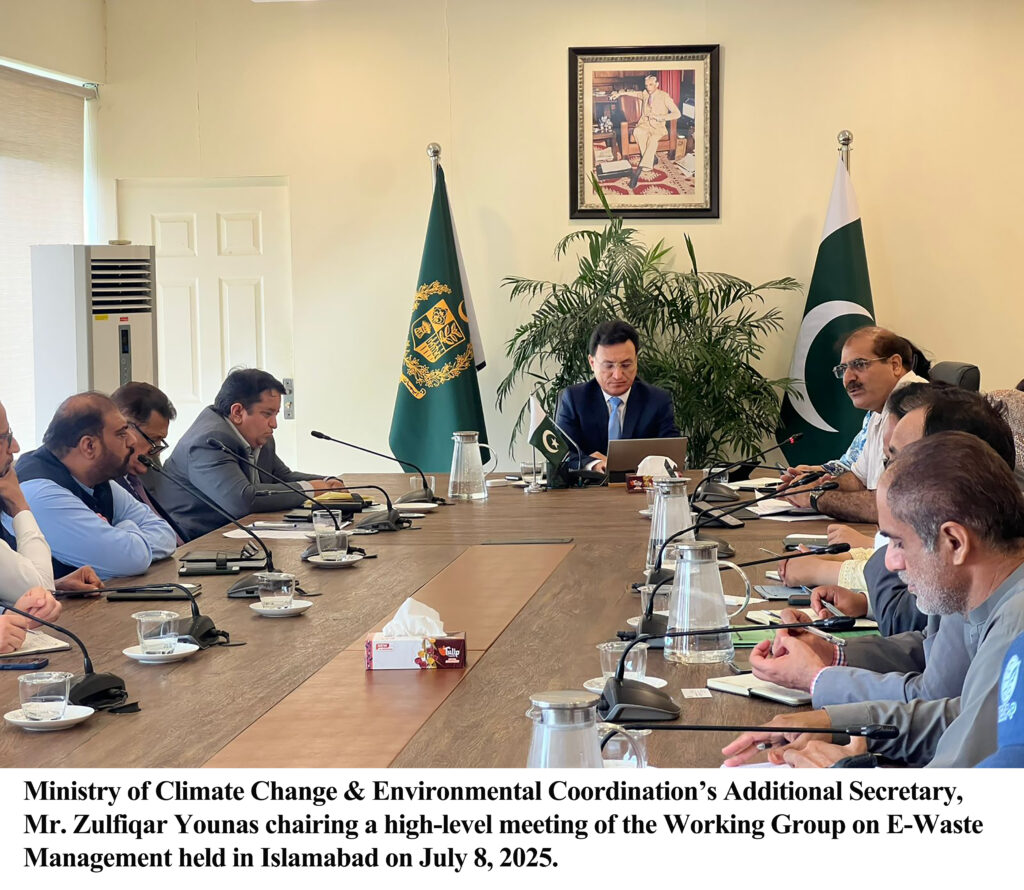ISLAMABAD; A high-level consultative meeting was convened at the Ministry Climate Change & Environmental Coordination (MoCC&EC) to discuss terms of reference of the first working group to review the current status of electronic waste management in Pakistan, identify policy and regulatory gaps and initiate a roadmap for the formulation of a national e-waste management framework
Chaired by Additional Secretary of MoCC&EC, Zulfiqar Younas, the meeting participants underlined a need for a viable e-waste management framework to deal with adverse environmental and public health impacts of the e-waste management at all levels.
Addressing the meeting, the additional secretary raised concerns during his opening remarks over the unsafe handling and informal recycling practices that dominate the country’s e-waste landscape.

“There is an urgent need for investment in formal recycling systems, national legislation and mass awareness regarding environmentally-safe e-waste management in the country,” Mr. Zulfiqar Younas remarked.
He said that despite the growing volume of electronic waste (e-waste) in Pakistan, there is currently no comprehensive national baseline data available to assess the scale, sources, composition, and handling practices of e-waste in the country. This data gap severely hinders effective policymaking, regulatory action, and the design of sustainable recycling infrastructure.
“A baseline study is urgently needed to map the full lifecycle of electronic products—from import and usage to disposal and informal recycling. This study should quantify the volume of e-waste generated annually, identify key hotspots (urban centers, dumping sites), assess the role of the informal sector, and evaluate environmental and health impacts,” the additional secretary Zulfiqar Younas stressed during his opening remarks.
E-waste is any electrical or electronic equipment that’s been discarded. This includes working and broken items that are thrown in the garbage or donated to a charity reseller like Goodwill. Often, if the item goes unsold in the store, it will be thrown away. Computers, televisions, refrigerators, air conditioners and fax machines etc are common electronic products. Many of these products can be reused, refurbished or recycled.
Director General (Environment & Climate Change) at MoCC&EC, Asif Sahibzada delivered a detailed presentation on the current status of electronic waste management in Pakistan, policy and regulatory gaps and future action plan for the formulation of a national e-waste management framework.
He also briefed the meeting about TORs of the working group, its expected outputs & timelines constituted for formulation of the national policy framework for e-waste management.
Sharing TORs of the working group, the director general MoCC&EC Asif Sahibzada informed the meeting that the working group comprising policy experts, senior government officials, academia and members of relevant private sector has been tasked with develop a national e-waste policy framework, provide technical input on policy design and implementation, identify regulatory gaps and institutional barriers and recommend effective governance and enforcement mechanisms.
Shed light on Pakistan’s growing challenges and benefits of environmentally-safe management of the electronic waste, Mr. Asif Sahibzada, DG MoCC&EC remarked, “Pakistan is facing a rapidly escalating challenge of electronic waste (e-waste) management as the nation experiences a surge in the use of electronic and electrical equipment. With more or less 500,000 tons of e-waste generated annually – and growing – the lack of formal collection, recycling systems and public awareness has created serious environmental and public health hazards.”
Director Pakistan Environmental Protection Agency-Islamabad (Pak-EPA), Dr. Zaigham Abbas informed the meeting that Pakistan, as a signatory to the Basel Convention on the Control of Transboundary Movements of Hazardous Wastes and Their Disposal, is taking critical steps to address the rising issue of electronic waste (e-waste). The Convention mandates the control of hazardous waste, including e-waste, to protect human health and the environment from its adverse effects.
To support implementation, two key documents have been developed under the Convention: the Revised Technical Guidelines on Transboundary Movements of Electrical and Electronic Waste, and the Guidance Document on Environmentally Sound Management of End-of-Life Computing Equipment. These aim to enhance the capacity of countries like Pakistan in handling, classifying, and managing e-waste responsibly, particularly by distinguishing between waste and non-waste equipment, the Pak-EPA official elaborated.
“With a majority of e-waste currently processed through informal and unsafe channels, the Ministry is advocating for a comprehensive national e-waste strategy focused on environmentally sound disposal, resource recovery, and regulation of informal recycling practices,” Dr. Zaigham Abbas remarked.
Meanwhile Director Urban Affairs at MoCC&EC, Muhammad Azeem said electronic waste is the biggest challenge in the country’s urban areas, which are becoming fast dumping grounds of discarded electronic waste.
“Urban centers of the country are facing an unprecedented escalation in electronic waste due to rapid digitalisation, rising consumption of electronic equipments and lack of formal disposal systems. Because, these centers have become hotspots for e-waste accumulation, where discarded mobile phones, computers, TVs, and household electric appliances are often dumped, burned, or informally dismantled without any safety measures,” the director urban affairs highlighted.


